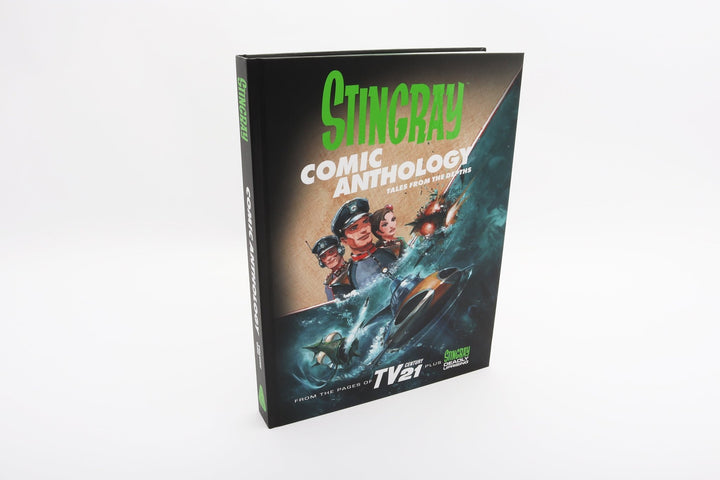Stingray: Deadly Uprising - Chris Dale Reveals his Titanican Stratagems

Stingray: Deadly Uprising takes its next huge leap forward with the release of Stingray: The Titanican Stratagem, now available to pre-order from the Official Gerry Anderson store. In this first full-length novel for the trans-media narrative, author Chris Dale, the Stingray crew must contend with a daring raid on Marineville by underwater despot Titan, who's unleashing a darkly ambitious plan to unite many underwater races to launch a final, devastating assault on the World Aquanaut Security Patrol.
Chris was good enough to pause his Battle Stations duties and join us in Marineville's Standby Lounge for an in-depth chat about the making of The Titanican Stratagem, how the story fits within the Deadly Uprising arc, and his own personal relationship with Gerry and Sylvia Anderson's classic underwater Supermarionation TV series.
What is The Titanican Stratagem all about and what can fans expect from it?
Chris Dale: The Titanican Stratagem finds Titan in a bad mood – what else is new? – thanks to his repeated failure to destroy Troy Tempest and Stingray. Finally deciding to try a new approach, one of his agents (no, not that one!) breaks into Marineville and steals some classified documents that point the leader of Titanica towards potential allies for an all-out attack on Marineville. Unfortunately for him, his first choice of recruits prove less than willing to sign up, and the Stingray crew are caught in the resulting crossfire…
Without giving away too much more readers can expect a fair amount of action, adventure, humour and some fun character moments, as well as appearances by several familiar faces from the television series (both good and bad)…and maybe even a dash of romance!
How does this adventure fit into the wider Deadly Uprising narrative?
Chris Dale: Despite following on from the Deadly Concerto story performed at the Stand by for Action 2 concert, The Titanican Stratagem essentially kicks off the main narrative of the Deadly Uprising saga, with the theft of the classified documents and Titan’s attempts at forming an alliance being running threads throughout subsequent Deadly Uprising stories.
It also introduces a new regular character in the form of World Security Patrol operative Lieutenant Sara Coral, who’ll also be appearing in subsequent Deadly Uprising stories. Sara’s been assigned to Marineville to attempt to get a handle on the frequent security breaches at the base and she’s proven great fun to introduce, as well as a useful way of exploring how unusual the cosy family atmosphere of the Marineville team might seem to an outsider.
As with all segments of Deadly Uprising however The Titanican Stratagem is designed first and foremost to be a self-contained story, albeit one that readers will get more out of if they choose to continue the narrative it sets up through the upcoming comic anthologies and the Project Orca novella.

This is the first original Stingray novel since 1965’s Stingray and the Monster. How does it feel to be creating a brand new Stingray saga?
Chris Dale: Although there have been new Stingray adventures in various comics and storybooks in the decades since it is very strange to think that no-one has written a Stingray novel since the 1960s, and so I do feel a sense of responsibility to ensure that The Titanican Stratagem does justice both to the series and the two novels that went before it. That’s a trait that seems to run through all of us who are writing new stories for the Deadly Uprising saga, the desire to do justice to a series and characters that we all love.
One thing I particularly wanted to ensure was that Stratagem felt authentic not only to the series, but also to the time period in which the series was made. For instance, at one point in my first draft a character referenced a movie from the 1980s; fine for someone living in the actual 2060s, but it wouldn’t have been true to the 2060s as imagined by the Stingray writers of the 1960s. So that obviously had to go.
I also have an advantage that John Theydon didn’t have while penning his Stingray novels back in the 1960s of having every episode available to refer to instantly, along with memories of many many repeat viewings over the last three decades. So if nothing else, I hope Stingray’s world and characters feel exactly as they did in the original television series!
My goal really was for The Titanican Stratagem to feel like the first episode of a second season of the television series, doing the kinds of things you might expect the first episode of a ‘new’ season to do; adding a new regular character, giving the main villain a new plan, but otherwise business as usual.


Was it a challenge to write a Stingray adventure that works as a standalone story but also works within a trans-media narrative such as this?
Chris Dale: The overarching plot of Deadly Uprising (Titan putting together a vast alliance of underwater races to finally destroy Marineville) lends itself to telling individual stories surprisingly well, so it wasn’t too much of a challenge to come up with a story that worked on its own and within the larger narrative. The central idea is essentially ‘Titan kicks the hornets’ nest and everybody gets stung’, which could have played out on television in a hundred different ways.
I also had the benefit of my story being pretty much first out of the gate, meaning that I really didn’t have to worry about making sure that what I wrote fitted in with anything that had gone before it. While I still had a checklist of elements to be introduced to set up future stories I more or less had the freedom to introduce those however I wanted (particularly in the characterisation of Sara Coral), and I can only apologise for any continuity headaches I may have caused my fellow writers further downstream in the Deadly Uprising story!
What might you say makes The Titanican Stratagem a unique entry in Deadly Uprising?
Chris Dale: For starters, it’s easily the longest story in the Deadly Uprising narrative! I overran my allocated word count by, well, a lot (although thankfully nobody tried to stop me!) and part of the reason for that is simply that I was having so much fun writing for the show’s characters! Anyone familiar with the scripts I wrote for Big Finish’s Terrahawks audio revival will be aware that my episodes tended to be among the longest, usually because I so enjoy letting these characters have conversations with each other, and it’s been a similar story with Stratagem.
But I would say that what makes Stratagem most unique is that it offers a chance to spend a lot of time with the show’s characters, all of whom I discovered are a delight to write for. Whether it’s Commander Shore’s sweet relationship with Atlanta, Troy Tempest and Titan locked in a cell together, spending time in Marina’s headspace, Sara Coral’s journey towards understanding the Marineville family, or taking a very Mr. Burns and Smithers approach to dialogue between Titan and X-20, there were so many relationships and character beats that I really wanted to touch on before the novel’s conclusion.
It’s as much about the characters as the events they’re experiencing, and I wanted to make sure everyone got some time in the spotlight – and not just the leads either. It may be a bold claim to make, but I’m pretty sure every Stingray character who was in more than one episode of the series either appears or is mentioned in some form here, and it’s particularly wonderful to be able to reach into that toybox and play with some characters that nobody’s really written for since the 1960s.

What’s your own relationship with Stingray? When did you discover the series?
Chris Dale: I first hopped on board Stingray in 1992, when the BBC aired the series following their highly successful repeat run of Thunderbirds. I believe I was on holiday when those repeats started, so I’m pretty sure the first episode I ever saw was Hostages of the Deep – which Genome tells me aired on October 2nd 1992, so I’ve spent just over thirty years with the series by this point.
As with Thunderbirds, Stingray was a big hit with me when I first saw it. I had no conception of it having been produced before Thunderbirds or looking in any way ‘inferior’ by comparison – it was just more of that same Thunderbirds magic that I’d loved so much. Brave heroes, naughty villains, great vehicles, excitement from the moment the opening titles kicked in - and of course, lots of wonderful explosions. Given the haphazard scheduling of that initial BBC screening there were probably about a dozen episodes of the show that I had never seen by the time the DVDs came along in 2001, which was a pleasant surprise – in fact, the very first DVD I ever bought was Stingray volume 5! I’ve also still got most of the Stingray merch I got back in the 90s, including the wonderful comics and toys – though sadly I never had a Marineville to call my own! One day…
As the years went by and I got to experience more and more Anderson shows, to the point where I’ve now seen pretty much everything, I found my favourite productions were those produced after Thunderbirds – the more realistic and slightly more adult worlds of Scarlet and Joe, and the live-action near-futures of UFO and Space:1999. Stingray does tend to sit in the shadow of much of what came after it, and I’ve probably been guilty of overlooking it at times in favour of those later slightly more polished productions – which means I’m always delighted when I go back to it and remember just what a terrific achievement the show is in its own right!
What is it about Stingray that makes it such a unique entry in Gerry Anderson’s body of work?
Chris Dale: Stingray comes along at a time when AP Films have just had the biggest success they’ve yet enjoyed with the sale of Fireball XL5 to NBC, and they’re still determined that the best is yet to come. The company’s move to their new studio on Stirling Road gave the entire production a lift on all fronts (aided by the switch to colour, although the majority of viewers at the time would have still been watching in black and white), offered them the freedom to expand the scope of their storytelling – and crucially, create visuals to match. You can really tell watching Stingray that this is a show produced by people who are heading for the big screen; the world is more realistic, more believable and so much bigger than before. Many people say that the appeal of Thunderbirds is that the best episodes of the series feel like blockbuster movies that don’t know they’re being made for television, but I really feel that quality began with Stingray.
It’s also one of the most consistent Anderson shows in terms of quality; there are very few episodes of the show that don’t work, and even those that don’t are so offbeat and bizarre that they’re something of a guilty pleasure anyway. Speaking of bizarre, when the show tries to be funny it’s genuinely some of the funniest material to carry the Anderson name (Titan Goes Pop, I’m looking at you)…and yet it’s equally capable of turning out such great dramas as The Master Plan. That the show could pivot effortlessly between drama and comedy is a great tribute to the skill of its writers and performers.

At times Stingray can feel like a slightly more polished take on the Fireball XL5 formula, and the show certainly inherits a lot of the storytelling tropes of XL5; from amusing ones - like most of the show’s underwater races consisting of just two guys with the promise of an entire civilisation waiting just behind that door over there – to genuinely inspired ones, such as the admirable way episodes like Sea of Oil, The Disappearing Ships and The Lighthouse Dwellers find their drama in misunderstandings with otherwise friendly races.
Stingray also boasts arguably the finest soundtrack Barry Gray ever composed for any Anderson series - a controversial view perhaps, but I’m sticking by it! I think the extent to which it was still being mined by later productions for reusable tracks even ten years later shows that Barry himself was aware of how exceptional many of those Stingray incidentals were, even by his own high standards.
Can you tell us about any other projects you’re involved in as part of Deadly Uprising and Stingray’s forthcoming 60th anniversary?
Chris Dale: At the present moment, aside from a quick voice role in the final episode of the Marine Minutes web series (and of course having written every single word of The Titanican Stratagem’s upcoming audiobook release, read wonderfully by New Captain Scarlet himself Wayne Forester) I can honestly say I have no involvement with any other Stingray 60th anniversary projects. That doesn’t mean to say that something unexpected won’t come along, but for now I can sit back and enjoy the rest of the Deadly Uprising saga along with everyone else! Which is fine with me, as I cannot wait to get my paws on those Stingray comic anthologies and relive all those classic TV Century 21 adventures once more.

Pre-order your signed copy of Stingray: The Titanican Stratagem now! Don't forget to catch up with the Deadly Uprising saga so far with the release of Stand By For Action! 2: Tunes of Danger and the ongoing mini-episodes Marine Minutes on the Official Gerry Anderson YouTube channel!
To be the first to hear about the latest news, exclusive releases and show announcements, sign up to the Anderson Entertainment newsletter!




![Thunderbirds Comic Anthology Volume One [HARDCOVER] - The Gerry Anderson Store](http://gerryanderson.com/cdn/shop/files/thunderbirds-comic-anthology-volume-one-hardcover-8030771.jpg?v=1751089031&width=720)
![All Sections Alpha: The Making of Space: 1999 [HARDCOVER] - The Gerry Anderson Store](http://gerryanderson.com/cdn/shop/files/all-sections-alpha-the-making-of-space-1999-hardcover-7498116.png?v=1757766647&width=720)

![Stingray Comic Anthology Volume Two – Battle Lines [HARDCOVER] - The Gerry Anderson Store](http://gerryanderson.com/cdn/shop/files/stingray-comic-anthology-volume-two-battle-lines-hardcover-107681.jpg?v=1738856151&width=720)
![Stingray W.A.S.P. Technical Operations Manual Standard Edition [HARDCOVER] - The Gerry Anderson Store](http://gerryanderson.com/cdn/shop/files/stingray-wasp-technical-operations-manual-standard-edition-hardcover-112278.jpg?v=1749664163&width=720)
![Stingray WASP Technical Operations Manual Special Limited Edition [HARDCOVER BOOK] - The Gerry Anderson Store](http://gerryanderson.com/cdn/shop/files/stingray-wasp-technical-operations-manual-special-limited-edition-hardcover-book-991914.jpg?v=1749657538&width=720)
![Stingray: The Titanican Stratagem – Signed Limited Edition [HARDCOVER NOVEL] - The Gerry Anderson Store](http://gerryanderson.com/cdn/shop/files/stingray-the-titanican-stratagem-signed-limited-edition-hardcover-novel-129251.jpg?v=1740558711&width=720)







